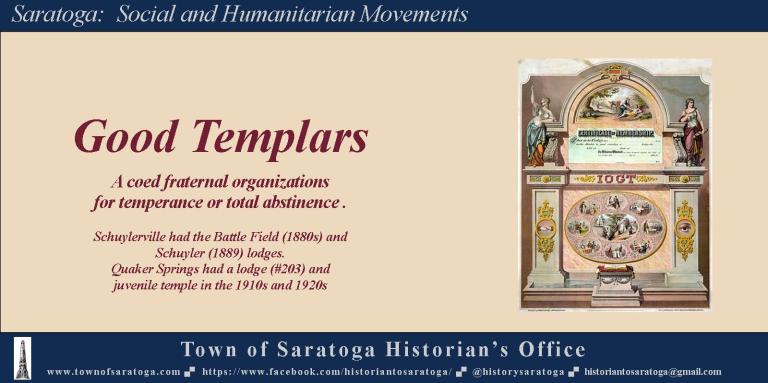
The Saratogian (24 June 1919) reported: “The Kitchen Band Concert which was given under the auspices of the Juvenile Temple of Good Templars, recently was a success and reflected great credit on the children who took part as well as the Grand superintendent” Mrs. Millie Watkins Wright was the Superintendent. She was born in Amsterdam, NY and lived in the hamlet of Quaker Springs in the town of Saratoga. Mrs. Wright was the active in the International Order of the Good Templars. The Good Templars is a coed fraternal organizations for temperance or total abstinence founded in the 19th century and with a structure modeled on Freemasonry, using similar ritual and regalia. The first accounts of a lodge is the Schuylerville Battle Field lodge in 1880 and the Schuyler lodge in 1889. Then there was The Quaker Springs lodge #203 along with a Juvenile Temple. Mrs. Wright was elected as the Secretary of the national Juvenile Works Department in 1919. The Amsterdam (NY) Evening Record reported on 21 February 1919 that she was originally from that city and was active in the Good Templars for a number of years. The article describes her as “a successful Juvenile worker in her own state and a grand superintendent of Juvenile work who has been painstaking and devoted in her labors, Mrs. Wright will no doubt bring to the higher position and enthusiasm that will be welcomed.” She served as Superintendent of the Juvenile Works Department of the New York and National Grand Lodge in 1921. In September of 1930, she passed away in Amsterdam, NY. At the time of her death, she was still a State officer of the Good Templars. During the Progressive Era (1890–1920), hostility toward drinking alcohol became widespread, with the Prohibition Party and the Woman’s Christian Temperance Union as the most influential advocate of prohibition. In New York, there is a long history of social reform movements started or flourished along New York’s canal system. (The Good Templars started in Utica, NY along the Erie Canal in 1850.) The rural part of the town of Saratoga in particular Quaker Springs (along the Champlain Canal) was not immune to these social movement. The community had an active Quaker community that formed the Quaker Springs Anti-Slavery Society in 1836, and the Old Saratoga Anti-Slavery Society in 1850. Prohibition was also strongly supported by the Methodists and Quakers, which have the only churches in that part of the town. Prohibition began on January 16, 1920, when the Eighteenth Amendment went into effect. Saratoga has been defined by the people who by choice or by chance make up this community. There are many individuals and groups like the Good Templars that help define this country, our region, and this community. It is the determination of our forefathers, in surmounting overwhelming odds that help define the American spirit – the will and ability to shape a better future. It is the people it is that define this community by choice or by chance have changed this country and even the world. That is why studying the people of Saratoga is integral to a good understanding of the condition of being human.